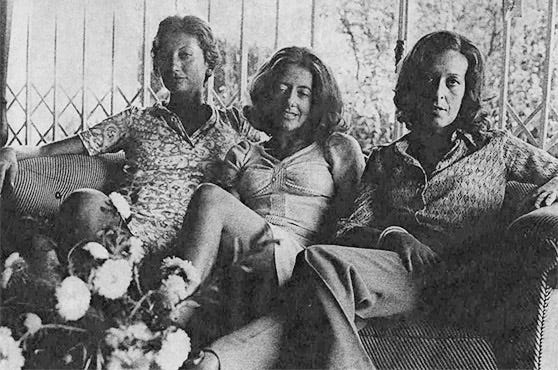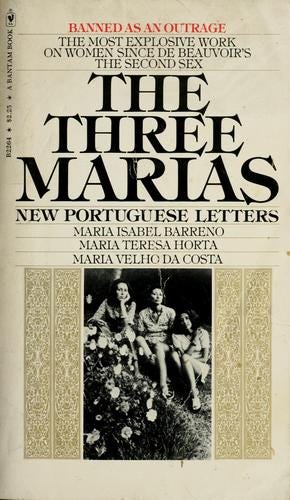The Three Marias: Arrested & Imprisoned in Lisbon in 1973
"Banned as an Outrage;" but Praised after Carnation Revolution
New Portuguese Letters (Portuguese: Novas Cartas Portuguesas) is a literary work composed of letters, essays, poems, fragments, puzzles and excerpts from legal documents, published jointly by the Portuguese writers Maria Isabel Barreno, Maria Teresa Horta and Maria Velho da Costa in 1972. The authors became known internationally as "The Three Marias," which became the title of the book in its first translation to English.
By writing and publishing The New Portuguese Letters (1972), Maria Barreno, Maria Velho da Costa and Maria Teresa Horta led the modern feminist literary movement in Portugal and achieved notoriety because of the government's attempt to suppress their work.
The book's publication and banning, its subsequent stage adaptations, and the international outcry over the arrest of the authors, revealed to the world the existence of extremely discriminatory dictatorial repression and the power of the Catholic patriarchy in Portugal. New Portuguese Letters also denounced the injustices of Portuguese colonialism, and played a part in the downfall of the Second Republic and the authoritarian regimes which had ruled Portugal since 1926.
Novas Cartas Portuguesas (New Portuguese Letters), was banned in 1972 in Portugal for exploring sensitive issues such as women's oppression under the Catholic patriarchy. 1
The book was immediately successful in Portugal after its publication in 1972, and acclaimed as a masterpiece, but was quickly banned by censors, described as "pornographic and an offense to public morals", and the three authors were arrested and imprisoned, charged with "abuse of the freedom of the press" and "outrage to public decency". The book and the arrests became internationally famous.
In 1973, an international appeal was addressed via Christiane Rochefort to the French Women's Liberation Movement. The stage was set for international feminist action on an unprecedented scale. The radical feminist Robin Morgan organised a Broadway benefit evening with dramatic presentations from the book.2 Portuguese embassies were picketed. Demonstrations were held across major cities in Europe and the USA. Feminists in Paris processed to Notre-Dame bearing effigies of the Three Marias. 3
Following the Carnation Revolution4 of April 25, 1974 which ended the dictatorship of Marcelo Caetano,5 the trial was terminated and the authors pardoned, with the judge declaring the book "of outstanding literary merit".
Ana Margarida Dias Martins. “Novas Cartas Portuguesas: The Making of a Reputation.” Journal of Feminist Scholarship, no. 2 (2012): 24–39.
Morgan, Robin. 2001. Saturday's child: a memoir. New York: W.W. Norton.
Owen, Hilary. “Exiled in Its Own Land.” Index on Censorship 28, no. 1 (1999): 57–60.
The Carnation Revolution also known as the 25 April was a military coup by left-leaning military officers that overthrew the authoritarian Estado Novo regime on 25 April 1974 in Lisbon, producing major social, economic, territorial, demographic, and political changes in Portugal and its overseas colonies through the Processo Revolucionário Em Curso. It resulted in the Portuguese transition to democracy and the end of the Portuguese Colonial War.
Marcello Caetano (1906-1980) was the second and last leader of the Estado Novo after succeeding António Salazar. He served as prime minister from 1968 to 1974, when he was overthrown during the Carnation Revolution.






I vaguely remembered this from when I was small.
We'll be having our turn with this crap next.
elm
*sigh*